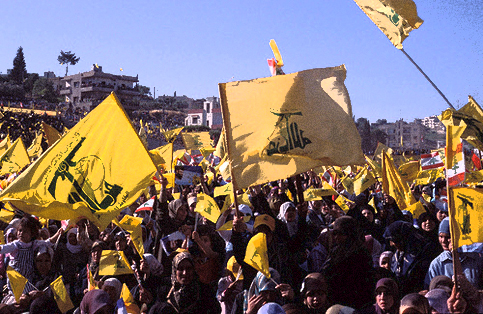- Challenging Hezbollah’s listing as a ‘Terrorist’ Group in Canada

In 2006, Tadamon! commenced a process of study and critical reflection on the Canadian government’s decision to add the Lebanese resistance movement, political party and social organization Hizballah to its “List of Entities.”1 This process led us to conclude that the addition of Hizballah to the list in December 2002 should be questioned and challenged. We arrived at this conclusion in light of both the circumstances surrounding the government’s decision to list Hizballah as well as the effects and implications of this decision on individuals, groups and communities in Montreal, Lebanon and elsewhere. Tadamon!, therefore, took on the task of bringing to public attention a critique of both the aims the Canadian government sought to attain by creating the List and the process and reasoning that led to the inclusion of Hizballah in the list. The intent of this undertaking was to inform the public, stir debate, raise critical awareness, educate and, ultimately, make and present a case for the de-listing of Hizballah.
In 2009, the Tadamon! collective suspended further work on the de-listing project. This decision was taken for two main reasons: (a) Tadamon! found that it has limited capacity to invest and expend resources – specifically time and human – in the pursuit of the project to its long-term end (namely, achieving the de-listing of Hizballah); (b) Tadamon! made a strategic choice to devote a significant share of its resources to the emergent and expanding campaign of Boycott, Divestment and Sanctions (BDS) against Israel as a means of advancing and securing justice for Palestinians and for all peoples in the region. The view was taken that the BDS strategy reveals and challenges the reigning configuration of power relationships in the Middle East region, and beyond, wherein it is possible for some states to define selected political actors (state and non-state) as purveyors of terror or as terror entities while sanitizing their own acts of violence, repression and domination. Tadamon! sees the general objectives of BDS as consistent with those of the project to challenge Canada’s “List of Entities.” For instance, the BDS campaign’s aim of exposing and challenging governmental practices and policies of exclusion, separation and denial of rights, which are features of the Israeli political and military regime of apartheid and occupation over Palestinians, is similar to and compatible with the aim of challenging tools of governmental power used in the “war on terror”, such as the “List of Entities,” that are also exclusionary, arbitrary and repressive.
The decision to suspend the project does not represent a disavowal of its guiding arguments and principles. Indeed, Tadamon! continues to take the view that Canada’s “List of Entities,” established under the auspices of the Anti-Terrorism Act and, more broadly, within the framework of Canada’s “national security agenda” and the more generalized “war on terror” paradigm, is deserving of critique, question and challenge. The List is an instrument of governmental power that, in our view, is the product of an analysis of developments and conditions in the Middle East region (and in the world) that is grounded in stereotype, misinformation and cultural and class bias. We contend, further, that, as an instrument of power, it is oriented towards the achievement of goals and outcomes about which Canadians should and would be concerned, namely:
While no longer actively pursuing the de-listing goal, Tadamon! will continue to advance these lines of critique more generally with respect to Canada’s “anti-terrorism” strategy and its national security agenda.
Some selected sources for more information:
Foster, Mary. “Selectively Terrified: How Hezbollah became a terrorist organization in Canada.” The Dominion. 40 (November 2006): 6 & 28.
Harb, Mona and Reinould Leenders. “Know thy enemy: Hizbullah, ‘terrorism’ and the politics of perception.” Third World Quarterly, 26, 1 (2005): 173-197.
Hindess, Barry. “Terrortory.” Alternatives (July-Sept) 2006.
Hovsepian, Nubar (ed.). The War on Lebanon: A Reader. Northampton, Mass.: Olive Branch Press, 2008.
Norton, Augustus Richard. Hezbollah: A short history. Princeton: Princeton University Press, 2007.
Razack, Sherene H. Casting Out: The Eviction of Muslims from Western Law and Politics. Toronto: University of Toronto Press, 2008.
Saad-Ghorayeb, Amal. Hizbu’llah: Politics and Religion. London: Pluto Press, 2002.
Staines, Deborah. “Introduction: Interrogating the “War on Terror” Paradigm,” in Interrogating the War on Terror: Interdisciplinary Perspectives, Deborah Staines, editor, pages 1-14. Newcastle: Cambridge Scholars Publishing, 2007.
Tadamon! Fires of War, Voices of Resistance: Understanding Israel’s attack on Lebanon. Pamphlet. Montreal: Tadamon!, September 2006.
“Report: Who is the Terrorist? A Critical Conversation on Hezbollah”. Tadamon! and Quebec Public Interest Research Group McGill, McGill University, Montreal, 17 October 2007. Webpage. 21 October 2007.
——————————–
1 The “List of Entities” was established by regulation under the authority of the Anti-Terrorism Act (an Act of the Canadian parliament). It lists those “entities”, in respect of which, in the judgement of the Solicitor General of Canada, there are reasonable grounds to believe have “knowingly carried out, attempted to carry out, participated in or facilitated a terrorist activity”. (Canada, Government of Canada, Chapter 41, Anti-terrorism Act, Statutes of Canada, Chapters 29-44, Vol. III, 2001)


